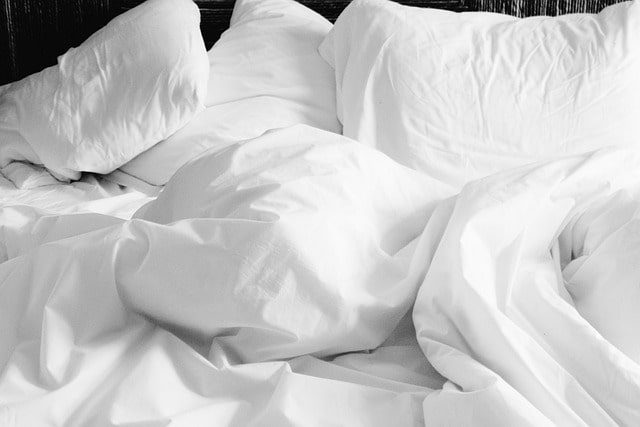
How To Get Better Sleep: 22 Amazing Tips To Wakeup Refreshed
Sleep and I have a love-hate relationship.
There has never been a time when I went to bed upset because I had to go to sleep. Well, excluding childhood years when most of us did everything we could to avoid nap time.
Oh who am I kidding, my love for sleep has no bounds. My alarm clock on the other hand, is an entirely different story.
How to get better sleep is something everyone tends to research at some point or another.
Sleeping in in the mornings or taking multiple naps throughout the day can be a nuisance sometimes when you run late or don’t get anything done due to low energy during the day.
Sleep disorders are not uncommon. However, many people do not realize how much their lifestyle and daily habits directly impact their sleep. Sleep is just as important as staying in shape and eating healthy.
Table of Contents
Sleep 101 & Why is it important?
Sleep is the naturally recurring altered state of consciousness where the mind and body are relatively inactive. If you want a more in-depth understanding of sleep stages and patterns, this Sleep Physiology article breaks it down in minute detail. https://www.ncbi.nlm.nih.gov/books/NBK19956/#:~:text=There%20are%20two%20types%20of,eye%20movements%2C%20and%20muscle%20tone
I think it is safe to say that most of us have read or been told how important and impactful good sleep can be at least once in our lives.
Anything from your mental health like depression, anxiety, or stress, to maintaining your physical state like consistent unhealthy eating, ill-timed caffeine consumption, or little to no exercise, can all contribute to your unrestful nights.
Sleep is essential to our health and overall way of life. Lack of sleep can cause a higher risk of health issues. Basically, during sleep your body works/rests to restore what energy you lost during the day.
Though sleep needs vary from person to person, most adults require between 7 and 9 hours of sleep per night. Yet, up to 35% of adults in the United States don’t get enough sleep
(1Trusted Source, 2Trusted Source).
Benefits
- Helps maintain weight
- Improves concentration and productivity
- Can maximize athletic performance
- May strengthen your heart
- Lowers risk of health problems
- Better sleep can help limit depression
- Supports a healthy immune system
- Linked to decreased inflammation
- Positively affects emotions and social interactions
- Can increase good decision-making
- Improves awareness and helps avoid injuries
- Enhances memory
- Restores energy
- Improves overall mental function and cognitive functioning
- Aids in quicker reflexes
- Betters calorie regulation
- Helps reduce levels of stress

How To Get Better Sleep
- Be Consistent With A Sleep Schedule: Keeping your sleep schedule consistent on workdays and off days will help keep your internal clock on track.
- Plan For No More Than 9+ Hours Of Sleep: The recommended hours of sleep every night is 7-8 hours. Sleeping too much or too long can be detrimental to your overall health.
- Create A Tranquil Environment: It is important to be in a more peaceful and relaxing environment before going to sleep. Having things quiet, dark, and at a comfortable cool temperature, will improve your sleep quality.
- Pay Attention To What You Eat And Drink: Making sure your last meal was no less than 2-4 hours before bedtime allows time for proper digestion. Avoiding caffeine in the afternoons/evenings will also ensure no added stimulus to keep the brain active.
- Mindful Of Alcohol: Consuming alcohol may make some tired, but it can actually contribute to poor sleep quality. Poor sleep quality can cause fatigue and sluggishness throughout the day among other things.
- Limit Naps During The Day: Napping too long or too often will most definitely throw off your sleep schedule and increase the amount of time you are awake at night.
- Exercise Consistently: Staying active can improve your sleep quality and reduce the amount of time it takes to fall asleep.
- Prioritize Mental Health: Managing stress, anxiety, worries, and depression (if present), can decrease sleep-related issues. Obviously that is easier said than done, but taking steps to improve your mental health will result in better sleep.
- Limit Electronic Devices / Screen Exposure Before Bedtime: Screen exposure near bedtime can keep your brain wired and damage your eyes in the long run. Using blue light settings or glasses will help lessen the long-term damage. * Reading or podcasts are great alternatives to watching TV or scrolling on your phone.
- Listening To Calm Music: “Music can reduce sympathetic nervous system activity, decrease anxiety, blood pressure, heart and respiratory rate and may have positive effects on sleep via muscle relaxation and distraction from thoughts.” Harmat, László et al. “Music improves sleep quality in students.” Journal of advanced nursing vol. 62,3 (2008): 327-35. doi:10.1111/j.1365-2648.2008.04602.x
- Meditation: Daily meditation especially right before bed, can improve your overall mental state which results in better sleep quality.

- Reflection & Visualization: Reflecting at the end of the day can decrease stimulus and help you unwind. Visualization can also relieve stress and put the mind at ease, flowing into a restful state.
- Stretching & Yoga: Engaging in relaxing poses with stretching and yoga before bed can better sleep quality by aiding in muscle recovery and relief. Not only does it help physical health, but it also helps with mental health as well by improving mindfulness and mental clarity.
- Self-Care: Most of the things on this list can fall under self-care. Making sure you make time for yourself before bed every night can positively impact your overall health. *Journaling or taking a bath every now and then are just a couple of the many things you can do.
- Tea: Drinking decaffeinated tea in the evenings can help the mind relax and unwind after a grueling day. It can be soothing and satisfying to hold a warm mug in your hand, taking an occasional sip of warmth, and allowing your thoughts to run free. *Popular nighttime teas are chamomile, lavender, and valerian root.
- Eating Healthy: Maintaining healthy eating habits will help provide better sleep quality and help regulate your sleep patterns.
- Melatonin: Melatonin helps keep the sleep-wake cycle regulated. Taking melatonin can help reduce sleep issues by increasing sleep duration and enhancing sleep quality. *Make sure you do research
- Comfortable Mattress & Bedding: I shouldn’t have to elaborate on this one too much, being comfortable will definitely get you several steps closer to better sleep at night. A lot of us may not be able to afford the fancy mattress and whatever other new technology they have coming out these days, but at the very least try and keep your bedding fresh and clean and have a decent pillow.
- Light Exposure: Light exposure is another factor that keeps the sleep-wake cycle regulated. Exposure to light during the day and entering a darker setting come nighttime, can help ease the body transitions and increase better sleep quality.
- Limit Bed Use: Consistently doing other things in bed like eating, working, watching TV, and so on, can prolong the time it takes for you to fall asleep. Your mind should associate your bed with sleep not a variety of different activities. Limiting your bed use will allow your mind to enter a restful state and fall asleep faster automatically.
- Sleep Tracker: Having a sleep journal or app to keep track of things may help you identify problems that contribute to a restless night.
- Night Routine Or Sleep Ritual: Winding down each night with a few calming activities can help prompt the mind and body that it’s time to sleep. Consistently doing these things every night will train the body and reduce the amount of time it takes to fall asleep.
Journey To Better Sleep
If you do not know where to start, just pick a few things off this list that may be easier for you to work into your schedule. Start to implement them into your daily routine and you can start to add on here and there. Hopefully one day, you will start waking up well-rested and refreshed, ready to tackle whatever comes your way!
*If your sleep problems have been consistent or serious you should definitely talk to a doctor. There could be something more going on and it is better to be safe than sorry.
Let me know in the comments which tips you plan on trying OR what your night routine is if you already have one!
ADMIN
Latest posts by ADMIN (see all)
- How To Conquer Jet Lag Fast With These Essential Travel Tips (Migraine Prevention) - April 19, 2024
- Amazing Book Reads: February 2024 - April 17, 2024
- Amazing Book Reads: January 2024 - April 14, 2024





8 Comments
Tammy
I think it’s important to have at least 30 min before bedtime to wind down and get the body ready for sleep. All phones and computers screens go off, tea has definitely helped, and some light reading to tire the mind. Great tips for a better sleep!
Lisa
These are really helpful tips. I have a hard time getting to sleep so I will definitely be trying some of these out. Thank you so much!
Sue-Tanya Mchorgh
I can relate to your love for sleep! It’s a wonderful feeling, but that pesky alarm clock often ruins the party. Your post highlights an important aspect of our lives that many tend to overlook – the significance of quality sleep. It’s a reminder that our daily habits and lifestyle choices can significantly impact our rest. Looking forward to reading more on how to improve sleep and prioritize this essential aspect of well-being!
Luna S
All of these are fantastic tips! Always important to make sure you are getting enough sleep, it can affect so many things if you don’t.
adriana
As I sit here typing this so exhausted, I could use this big time! I need better sleep! Thanks for sharing!
Lavanda Michelle
I’ve already started implementing some of your suggestions, like setting a consistent sleep schedule and limiting screen time before bedtime. It’s amazing how these small changes have made a noticeable difference in my sleep quality.
Karen
Amazing tips! I usually sleep well but recently it hasn’t been the case! I will try to exercise more and definitely minimize my screen time.
Tammy
I think working out often has helped my sleeping patterns more than anything and maybe keeping any caffeine to just the morning. I love a comfy, warm bed too.